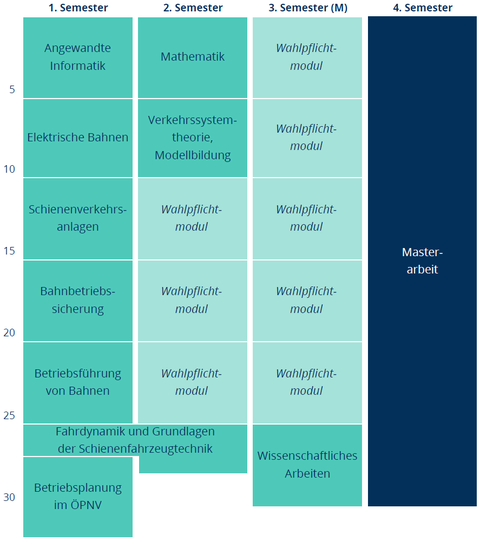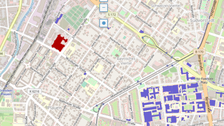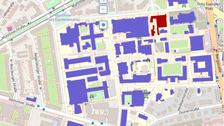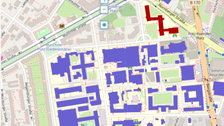Information on the Master Degree Railway System Engineering
On this page you will find all the information you need for your current studies.
General information about studying can be found here.
Table of contents
.
Study program
Your studies begin! The best 3 tips to make sure nothing goes wrong:
- Don't panic! There are support options for all situations!
- Read the study and examination regulations for your degree program at the beginning of your studies!
- Network with your fellow students!
You can find lots of information about the start of the semester here:
Welcome slide set | Website with tips & tricks
| Module# (VW-BSI) |
Modules and Courses |
|---|---|
| 02 |
Angewandte Informatik (5 LP)
PL: Written Exam (90 Min.) |
| 20 |
Elektrische Bahnen (5 LP)
PL: |
| 40 |
Schienenverkehrsanlagen (5 LP)
PL: Portfolio (40 hrs.) |
| 50 |
Bahnbetriebssicherung (5 LP)
PL: Written Exam (90 Min.) |
| 60 |
Betriebsführung von Bahnen (5 LP)
PL: Portfolio (30 hrs.) |
| 70 |
Betriebsprozesse und Betriebsplanung im Öffentlichen Verkehr ( 5 LP)
PL: Written Exam (120 Min.) |
| 80 |
Fahrdynamik und Grundlagen der Schienenfahrzeugtechnik (5 LP)
PL: Written Exam (150 Min.) |
| Modulnr. (VW-BSI) | Modules and Courses (The corresponding OPAL-course can be found here) |
|---|---|
| 01 |
Numerik im Verkehrswesen (5 LP)
PL: |
| 10 |
Verkehrssystemtheorie und Modellbildung (5 LP)
PL: |
|
80 |
Fahrdynamik und Grundlagen der Schienenfahrzeugtechnik (5 LP)
PL: Written Exam (150 Min.) |
| xxxx |
Electives (15 LP) You have to choose elective modules of at least 40 LP in your overall studies. |
| Module# (VW-BSI) | Modules and Courses (The corresponding OPAL-course can be found here) |
|---|---|
| 03 |
Grundlagen selbstständig wissenschaftlichen Arbeitens im Bahnsystemingenieurwesen (5 LP)
PL: Paper (75 hrs.) |
| xxxx |
Electives (25 LP) You have to choose elective modules of at least 40 LP in your overall studies. |
In this semester, you must write your Master's thesis (25 CP) and complete the associated colloquium (5 CP).
You can choose the topic of your Master's thesis yourself:
- The Chairs have various topics available for you to work on. These are published on the Internet or can be viewed on request.
- In some cases, it is also possible to work on your own topic suggestions (e.g. from practical contacts). In this case, the Chairs must be asked whether they can supervise the topic in terms of content and capacity.
| Please note the information for the final thesis at the Examination Office. |
Compulsory elective modules:
| Module# (VW-BSI) | Modules and Courses (The corresponding OPAL-course can be found here) |
|---|---|
| 12 |
Verkehrslogistik (5 LP)
PL: Written Exam (90 Min.) |
| 13 |
Erweiterte Verkehrssystemtheorie des Landverkehrs (10 LP)
PL: Written Exam (90 Min.) + Paper (30 hrs.) |
| 15 |
Planung und Steuerung von Verkehrs- und Logistikprozessen (5 LP)
PL: Written Exam (120 Min.) |
| 16 |
Pricing und Revenue Management (5 LP)
PL: Portfolio (80 hrs.) |
| 17 |
Materialflussrechnung und -optimierung (5 LP)
PL: Written Exam (90 Min.) |
| 18 |
Cargo Handling and Intermodal Transportation
PL: Portfolio (25 hrs.) |
| Module# (VW-BSI) |
Modules and Courses (The corresponding OPAL-course can be found here) |
|---|---|
| 21 |
Theorie elektrischer Verkehrssysteme (5 LP)
PVL: Homework (30 hrs.) |
| 22 |
Elektrische Nahverkehrssysteme (5 LP)
PL: |
| 23a |
Fahrleitungen (5 LP)
PL: |
| Modulnr. (VW-BSI) | Modules and Courses (The corresponding OPAL-course can be found here) |
|---|---|
| 31 |
Projektmanagement im Anlagenbau (5 LP)
PL: Written Exam (90 Min.) |
| 32 |
Qualitäts- und RAMS-Mangement (5 LP)
PL: Written Exam (90 Min.) |
| 33 |
Schaltungstechnik und Komponenten der Schienenverkehrstelematik (5 LP)
PL: Written Exam (90 Min.) |
| 34a |
Architekturen der Schienenverkehrstelematik (5 LP)
PL: |
| Module# (VW-BSI) |
Modules and Courses (The corresponding OPAL-course can be found here) |
|---|---|
| 41a |
Bau- und sicherungstechnischer Entwurf von Bahnanlagen (10 LP)
PL: Portfolio (100 hrs.) |
| 42 |
Planung von Bahnanlagen (5 LP)
PL: Portfolio (40 hrs.) |
| 43 |
Bahnbau (5 LP)
PL: Paper (60 hrs.) |
| 44 |
Rechnergestützte Konstruktionssysteme bei Planung, Entwurf und Bau von Bahnen (5 LP, starts in WiSe)
PL: Paper (60 hrs.) |
| 45 |
Building Information Modeling im Verkehrswesen (5 LP)
PL: Oral Exam (30 Min.) |
| 47 |
Bauen im Eisenbahnbetrieb (5 LP)
PL: Written Exam (120 Min.) |
| Module# (VW-BSI) |
Modules and Courses (The corresponding OPAL-course can be found here) |
|---|---|
| 51 |
Bahnsicherungs- und -leittechnik (5 LP)
PL: Oral Group Exam (30 Min.) |
| 52 |
Stellwerkstechniken und Bahnübergangssicherung (5 LP)
PL: Written Exam (90 Min.) |
| 53 |
Zugbeeinflussungs- und Fahrwegsicherungssysteme (5 LP)
PL: Written Exam (90 Min.) |
| 54 |
Digital Rail Summer School (5 LP)
PL: Paper (20 hrs.) |
| Module# (VW-BSI) |
Modules and Courses (The corresponding OPAL-course can be found here) |
|---|---|
| 61 |
Bahnbetriebsmanagement (10 LP, starts in SoSe)
PVL: Homework (45 hrs.) |
| 62 |
Bahnbetriebsprozesse und -betriebsplanung (5 LP)
PL: Portfolio (50 hrs.) |
| 63b |
Market-oriented Design of Rail Freight and Passenger Transport (5 LP)
PL: Portfolio (40 h) |
| 64a |
Einsatz der Schienenfahrzeuge (5 LP)
PL: |
| 66 |
Akteure, Prozesse und Regelwerke im System Bahn (5 LP)
PL: Written Exam (120 Min.) |
| 67 |
Fortgeschrittene Modellierung in der Eisenbahnverkehrswissenschaft (5 LP)
PL: Complex Work (60 h) |
| Module# (VW-BSI) |
Modules and Courses (The corresponding OPAL-course can be found here) |
|---|---|
| 71 |
Betriebsplanung und -management im Öffentlichen Verkehr (5 LP)
PL: Klausur (120 Min.) |
| 72 |
Betriebsführung im Öffentlichen Stadt- und Regionalverkehr (5 LP)
PL: |
| 74 |
Objectives, Tasks, Responsibilities and Instruments of Public Transport Authorities (5 LP)
PL: Paper (40 hrs.) |
| Module# (VW-BSI) |
Modules and Courses (The corresponding OPAL-course can be found here) |
|---|---|
| 81 |
Fahrwerke der Schienenfahrzeuge (5 LP)
PL: |
| 82a |
Bremsen der Schienenfahrzeuge (5 LP)
PL: |
| Module# (VW-BSI) |
Modules and Courses (The corresponding OPAL-course can be found here) |
|---|---|
| 91 |
Verkehrs- und Infrastrukturplanung (5 LP)
PVL: Homework (20 Std.) |
| 92 |
Grundlagen der Verkehrsmodellierung (5 LP)
PL: Written Exam (60 Min.) |
| 93 |
Verkehrsökologie (5 LP)
PL: Written Exam (90 Min.) |
Timetables and study documents
Module descriptions (current version)
Study plan (current version)
Study plan for part-time study (current version)
Study regulations (official announcement from 26.04.2023)
Examination regulations (official announcement from 26.04.2023)
Further documents and more information on the Regulations & Guidelines page.
Questions about the study program?
Here you will find detailed information about course, core examination and lecture-free periods.
Winter semester 2024/2025 schedule
01.10.2024 to 31.03.2025
Courses:
Mon, 14.10.2024 to Sat, 21.12.2024 and Mon, 06.01.2025 to Sat, 08.02.2025
Lecture-free periods/holidays:
- 1.10.2024 - 13.10.2024
- Matriculation ceremony: Thu, 10.10.2024
- Reformation Day: Thu, 31.10.2024
- Day of Prayer and Repentance: Wed, 20.11.2024
- Turn of the year: Sun, 22.12.2024 to Sun, 05.01.2025
- Lecture-free period: Mon, 10.02.2025 to Mon, 31.03.2025
- Core examination period: Mon, 10.02.2025 to Sat, 08.03.2025
End of summer semester 2025
01.04.2025 to 30.09.2025
Courses:
Mon, 07.04.2025 to Sat, 07.06.2025 and Mon, 16.06.2025 to Sat, 19.07.2025
Lecture-free periods/holidays:
- Easter: Fri, 18.04.2025 to Mon, 21.04.2025
- May 1: Thu, 01.05.2025
- Dies Academicus: Wed, 21.05.2025
- Ascension Day: Thu, 29.05.2025
- Whitsun: Sun, 08.06.2025 to Sun, 15.06.2025
- Lecture-free period: Mon, 21.07.2025 to Tue, 30.09.2025
- Core examination period: Mon, 21.07.2025 to Sat, 16.08.2025
Key
Times of day
Courses are held in 90-minute double sessions (DS):
1. DS: 07:30 am – 09:00 am
2. DS: 09:20 am – 10:50 am
3. DS: 11:10 am – 12:40 pm
4. DS: 1:00 pm – 2:30 pm
5. DS: 2:50 pm – 4:20 pm
6. DS: 4:40 pm – 6:10 pm
7. DS: 6:30 pm – 8:00 pm
Weeks
Some courses are held only every two weeks. In the timetable, a distinction is made between odd calendar weeks and even calendar weeks:
1st week: odd week, e.g. calendar week 41.
2nd week: even week, e.g. calendar week 42.
This web page lists the current calendar week.
Abbreviations
The letters in front of the course title indicate the type of course and its position in the curriculum:
V lecture, Ü exercise, S seminar, P lab course, SP language course, T tutorial
SWS semester periods per week, PVL prerequisite for examination, PL examination, Kl. written exam, Mdl. oral exam, LP credit points
O obligatory (compulsory module),
W optional (one of several courses must be chosen).
Compulsory and Elective Modules
- Compulsory modules = all students in a study program must attend the modules
- Elective modules = all students are able to select modules from a catalogue according to their field of study and focus, which are then treated as compulsory modules.
Cannot find your rooms? The shortcuts of the rooms confuse you? We help you!
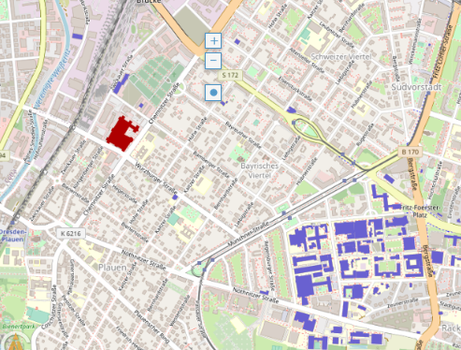
© CampusNavigator
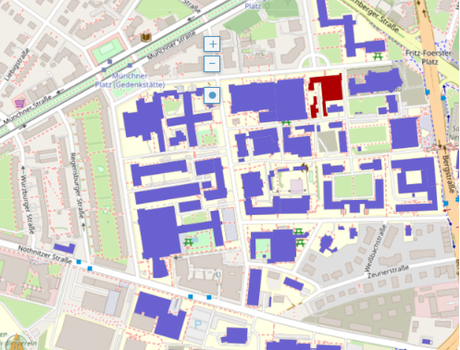
© CampusNavigator
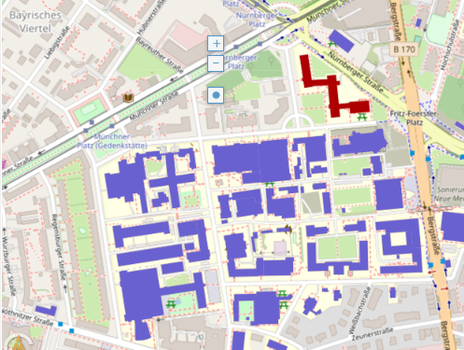
© CampusNavigator
With the help of the CampusNavigator of the TU Dresden you will find any room, no matter how small.
ECTS credit points (LP) document the average workload of students as well as their individual study progress.
One credit point corresponds to a workload of 30 hours. As a rule, 60 credit points are awarded per academic year, i.e. 30 per semester.
The total workload for the course of study corresponds to 300 credit points and comprises the forms of teaching and learning specified in the module descriptions in terms of type and scope, the course and examination work, as well as the diploma thesis and the colloquium. The module descriptions indicate how many credit points can be earned in each module. Credit points are acquired if the module examination has been passed.
In order to ensure the quality of courses, to create transparency, to generate insights, and provide meaningful feedback to instructors, our faculty takes great care to evaluate courses on a regular basis.
Therefore, you will be asked to fill out an online questionnaire in some courses towards the end of the semester. Your participation is very important - you can not only anonymously and confidentially share your perspective on teaching, but you will help to optimize teaching at the faculty with your honest and constructive feedback.
Several methods are used at the faculty:
Questions about the exams?
- Difference between examinations and preliminary examinations:
no grading for PVL (only pass/fail), PVLs can be repeated as often as you like,
maximum of 3 attempts for a PL. - A module examination usually consists of several examinations which are specified in the module descriptions.
- The examination modalities are determined by the teacher and announced at the beginning of the semester.
- The following examination performances are offered:
Written examinations, oral examinations, homework, complex performances, portfolios, scientific-practical performances, language examinations (only in language courses).
- For information on the examination dates and enrollment, please visit the website of the Examination Office.
- The examination period is the first 4 weeks of the lecture-free period.
- Selma enrollment for exams is necessary: enrollment in module and in exam.
- Stepping back is possible up to 3 working days before the examination date (civil law: without Sat and Sun) .
- In case of illness, accident, etc. (non-attendance of exams), please see website of the Examination office.
- Save/print overview of "Registered exams" for verification/ print/ keep ready at exam time.
- Exam results are available in selma, please save proof as PDF and archive (digitally)
- Repeat exams: The first repetition must be taken after one year, the second at the next possible time. (The enrollment for the second repetition counts as an application for the same).
- Free attempt: this means taking an exam ahead of time, the cancellation of the result is possible, but always related to the module exam! It is best to get information at the examination office!
Students with disabilities or chronic illnesses can apply for compensation, e.g. an extended exam time, or the use of aids. A medical certificate is required and the application must be submitted to the examination board in good time before the examination period.
You can find more information here.
Questions about studying?
Each student can take a total of 10 SWS (Bachelor/Diplom) or 4 SWS (Master) of foreign language training free of charge. Language training at TU Dresden is provided by TUDIAS GmbH.
In order to take advantage of the rich and interesting possibilities of the University Library, you can register online as a user here.
Sächsische Landesbibliothek – Staats- und Universitätsbibliothek Dresden (SLUB) © Sächsischen Bibliotheksgesellschaft
For example, you can borrow books and media, reserve work spaces and equipment in the SLUB-Makerspace, conduct research in the database and register for events and advisory services.
After you finish your studies, your SLUB user status will change and the Campuscard will no longer be valid for use as a library card. However, you can then receive a new SLUB card free of charge, allowing you to benefit from all the same SLUB services.
Don't worry. There a solution for every problem.
Have a look on our Counseling & Service website.
The TU Dresden implemented the Passt?!-Program as an early warning system for students in order to adequately react to challenging situations during your studies as needed. The participation is free, voluntary, and open to anyone.
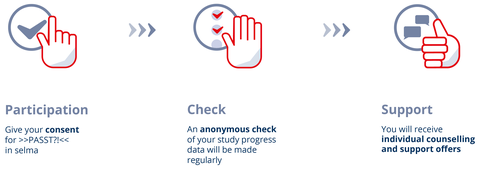
Workflow PASST?! Participation
The goal is to timely identify challenges and offer customized support and counseling to students.
Participation
You can log in and out of PASST?! at any time in the selma portal:
- Log in to the selma portal with your ZIH-Login and your password.
- In the menu to the left click 'Account'.
- Scroll down to the section 'Additional personal details'.
- Here you will find your current PASST?! participation status (Registration for the PASST?! program). Click ‘Edit’ on the right side in order to change your status.
- Using the drop-down menu, choose ‘Ich nehme teil.’ (I take part.) if you wish to participate in the program. Choose ‘Ich nehme nicht teil.’ (I do not take part.) if you do not wish to participate or you wish to withdraw. Once you have done so, click ‘Save’.
- After the status change, there is no further confirmation.
Further informationen can be attained here.
If you have questions about studying with disability and/or chronic illness, you will be supported by the relevant representatives with deciding on and applying for a course of study, organizing and completing your studies, receiving individual advice on compensating for disadvantages in studying as well as in examination performance, digital and structural accessibility as well as support options in everyday situations.
You can find further information here.
Helpful links
Contact Persons
For questions and problems: Please contact us!
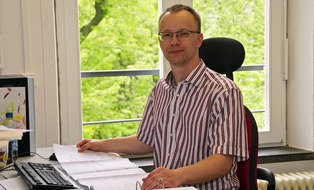 © Professur für Gestaltung von Bahnanlagen
© Professur für Gestaltung von Bahnanlagen
Studies Coordinator BSI
NameDr. Sven Hietzschold
Send encrypted email via the SecureMail portal (for TUD external users only).
 © Reichelt
© Reichelt
Academic Advisor
NameDr. Ulrich Maschek
Send encrypted email via the SecureMail portal (for TUD external users only).
 © Tobias Brohl
© Tobias Brohl
Student Program Coordinator BSI
NameTobias Brohl
Send encrypted email via the SecureMail portal (for TUD external users only).

